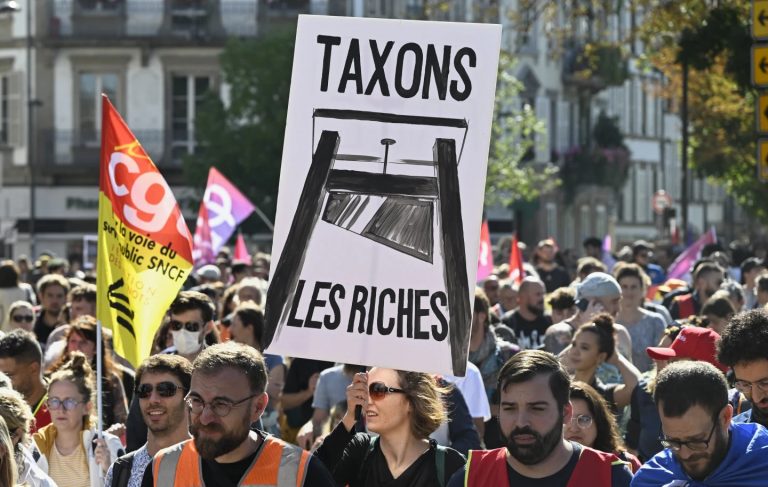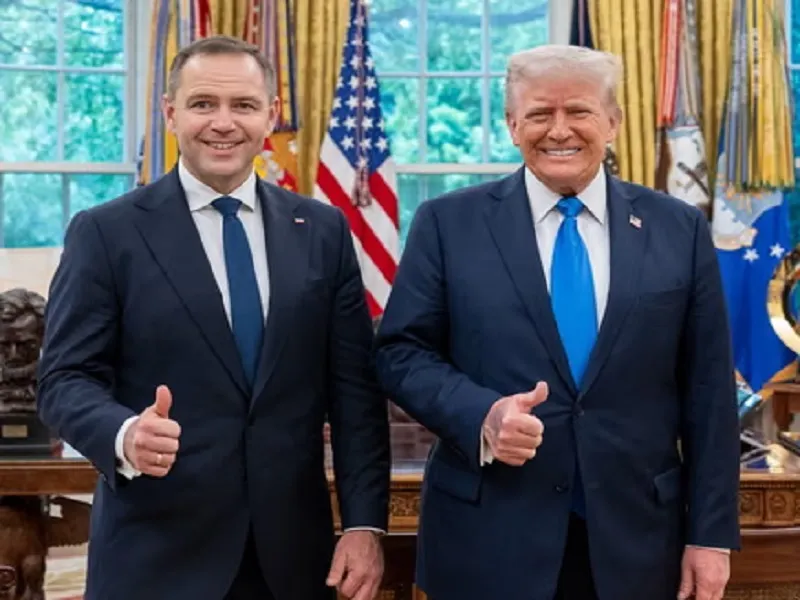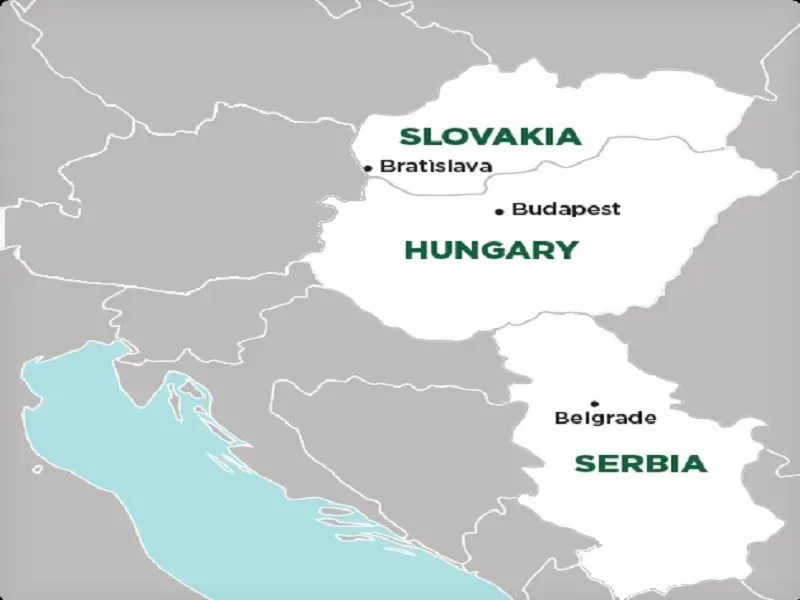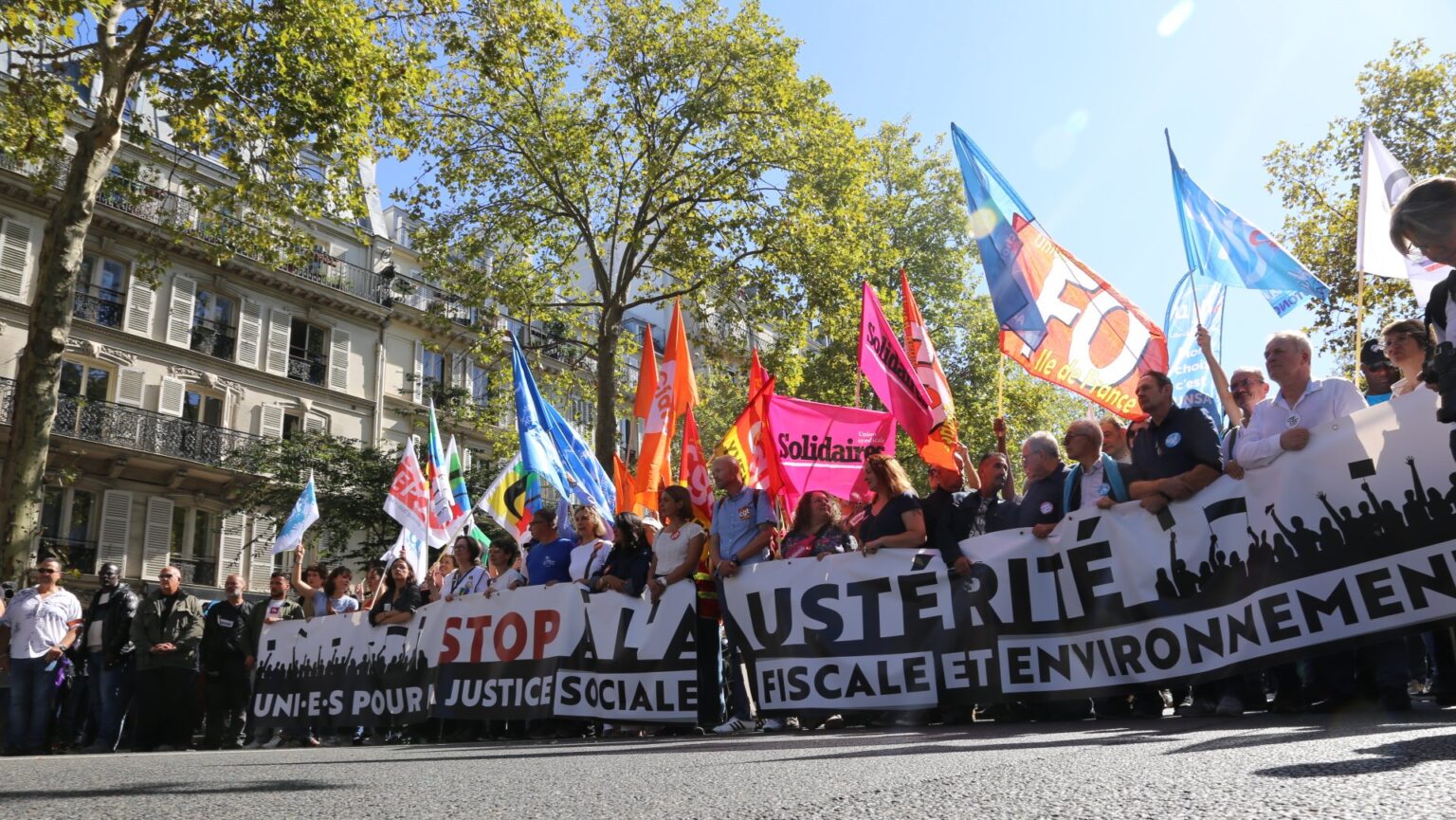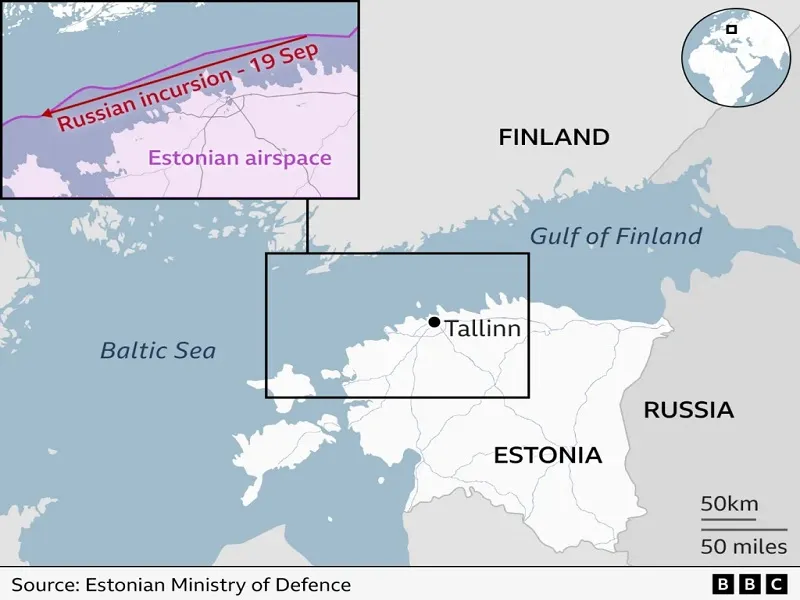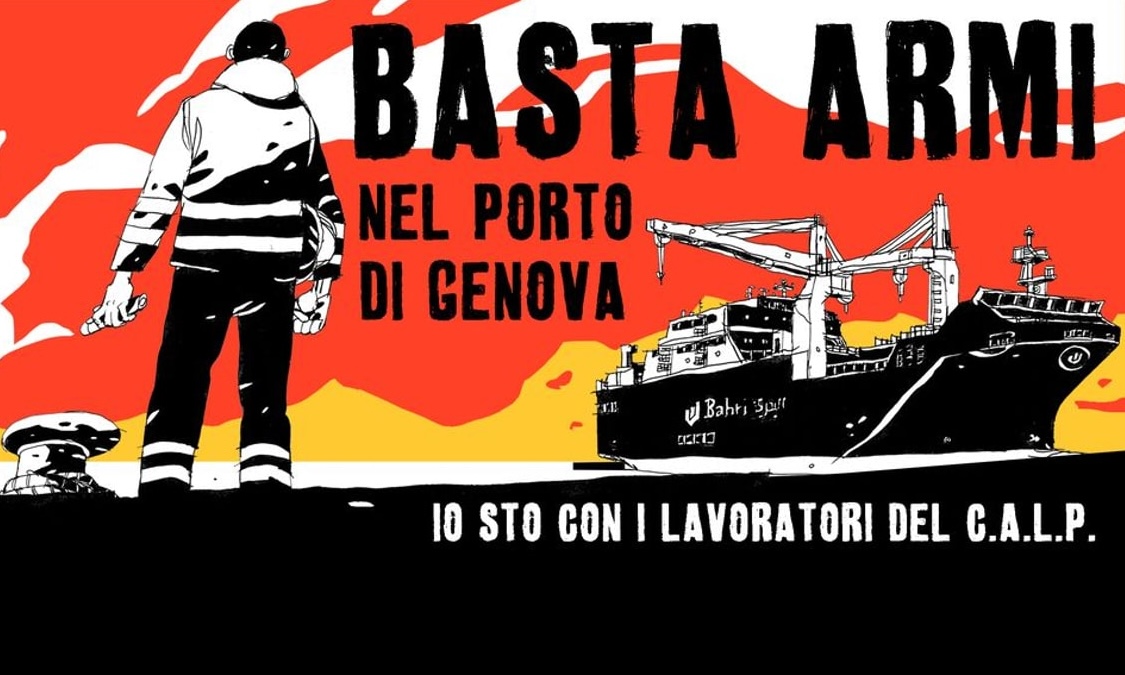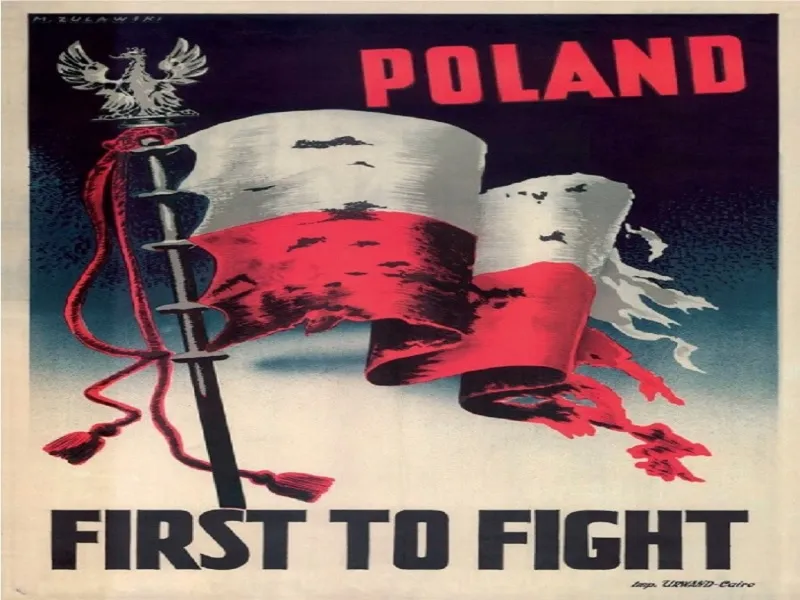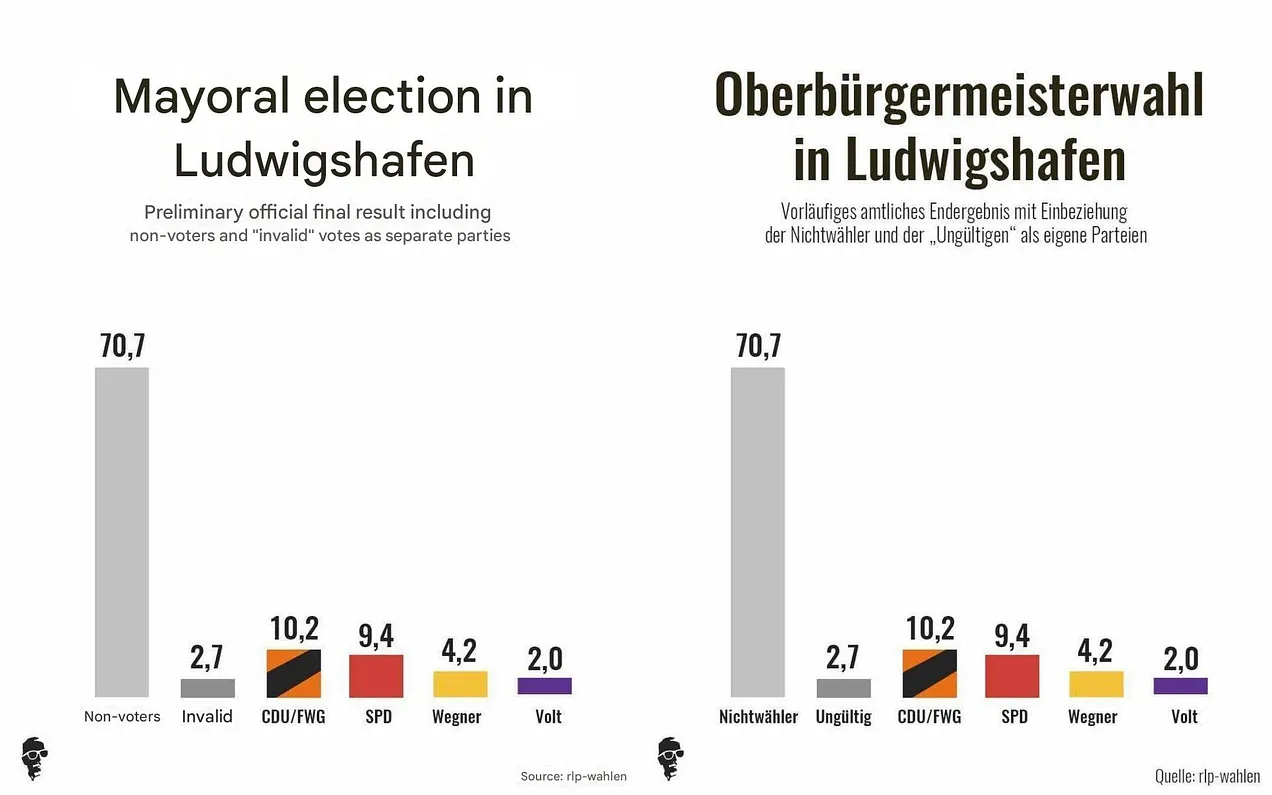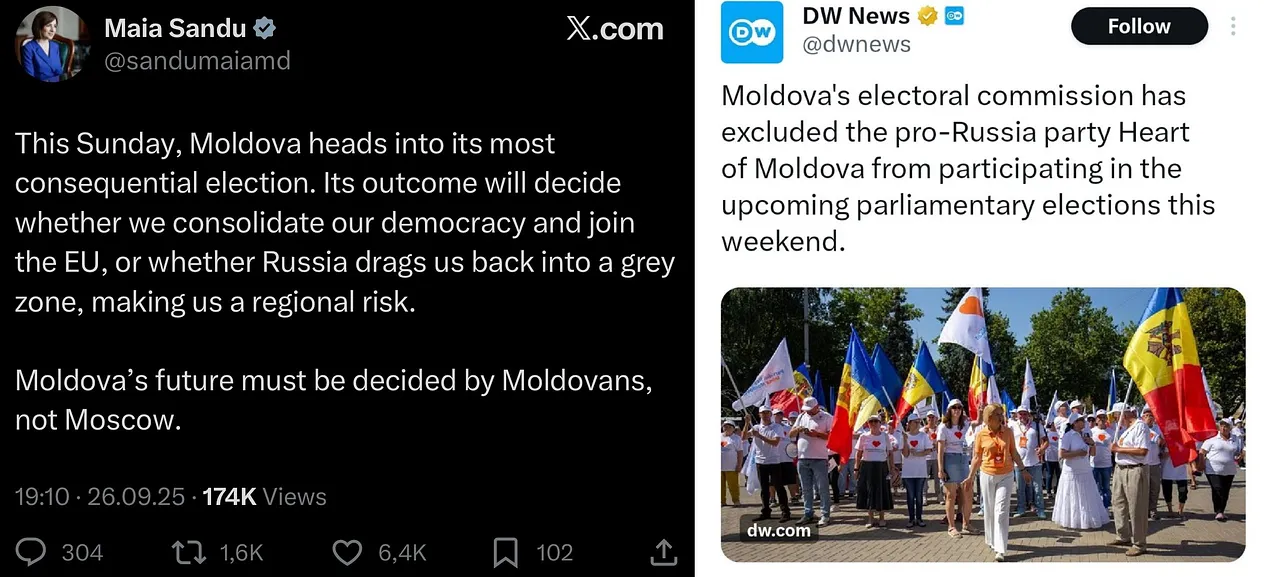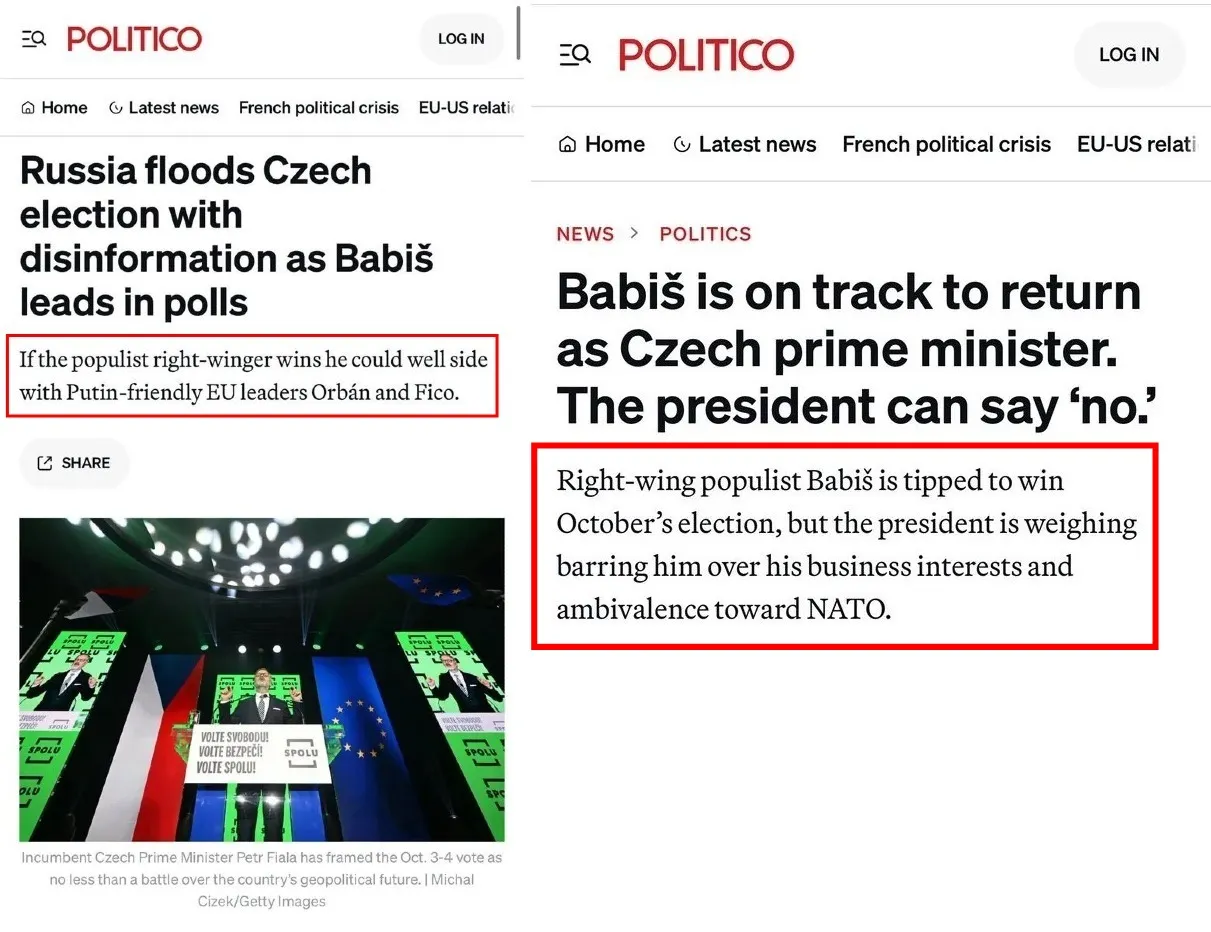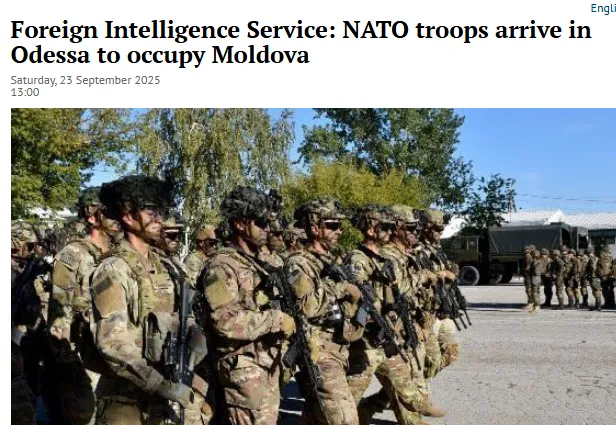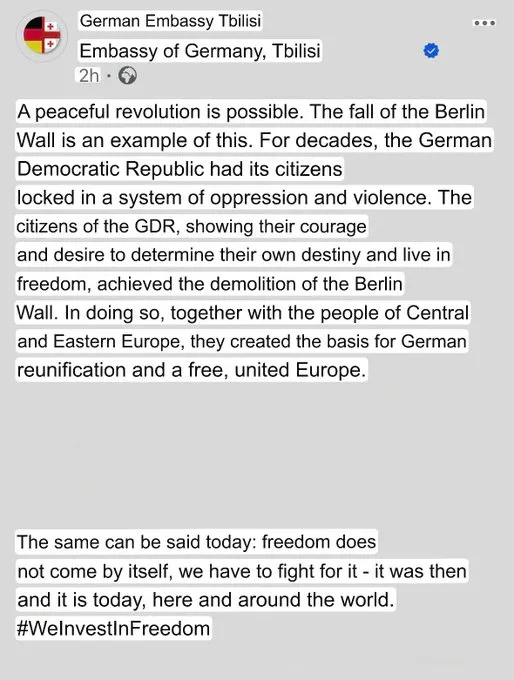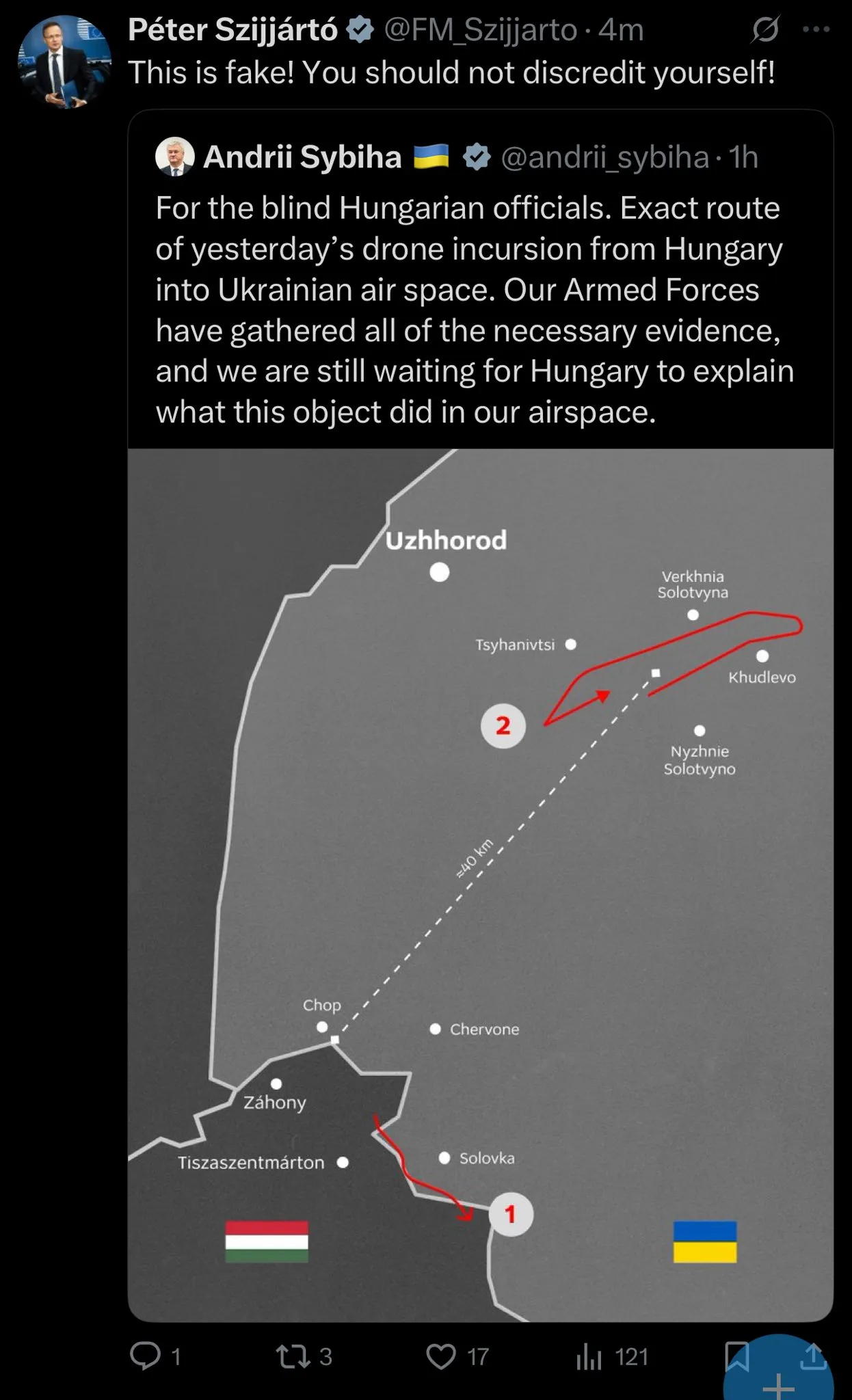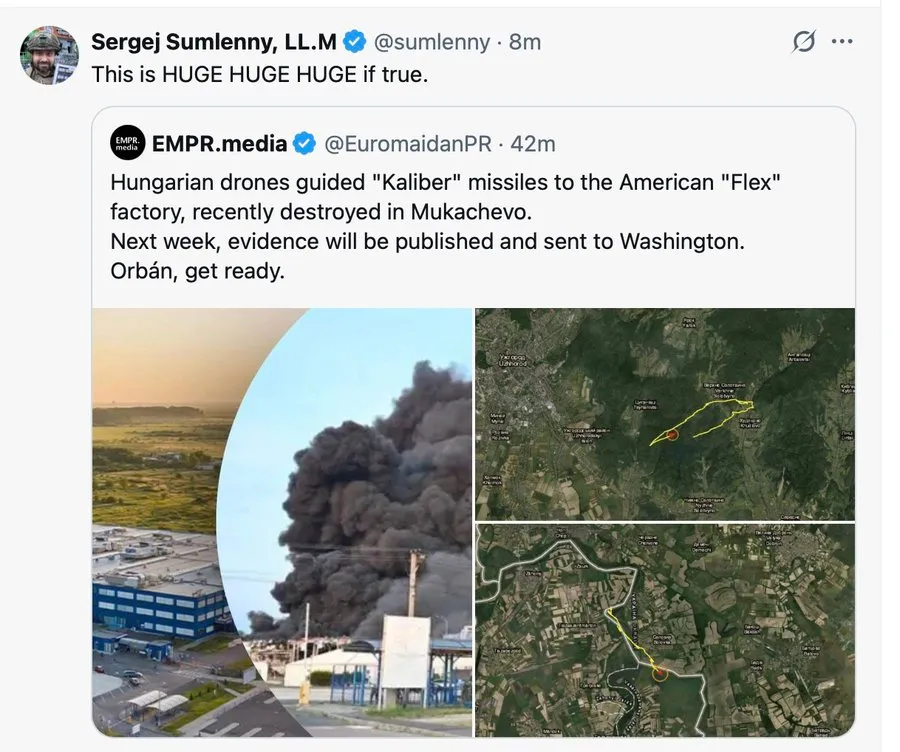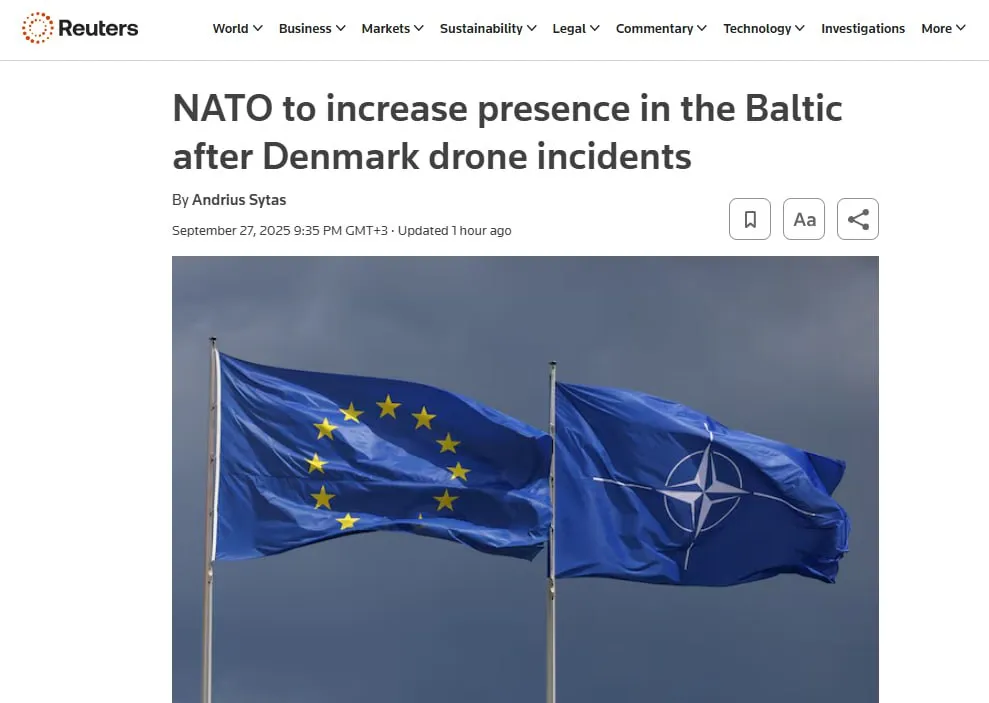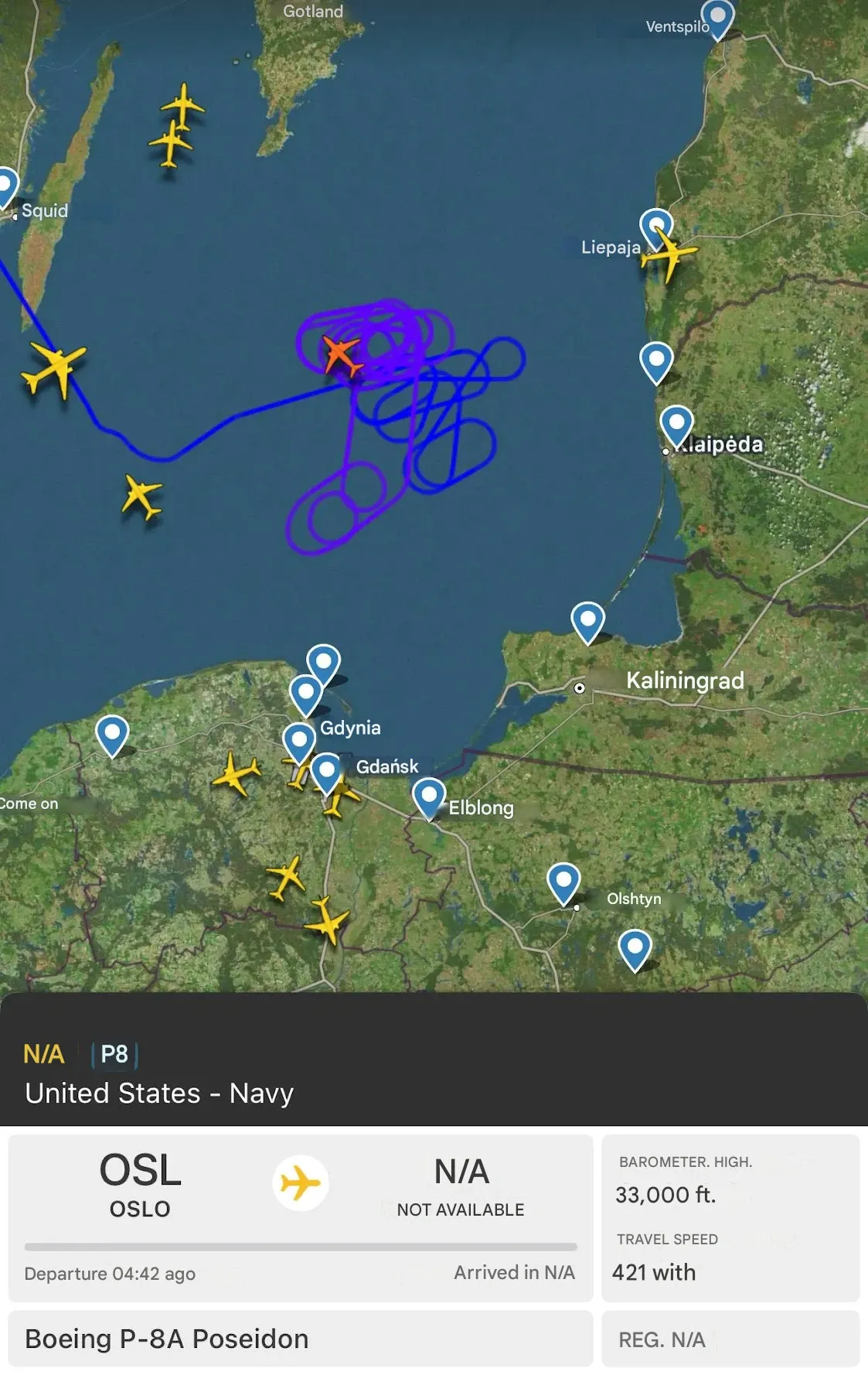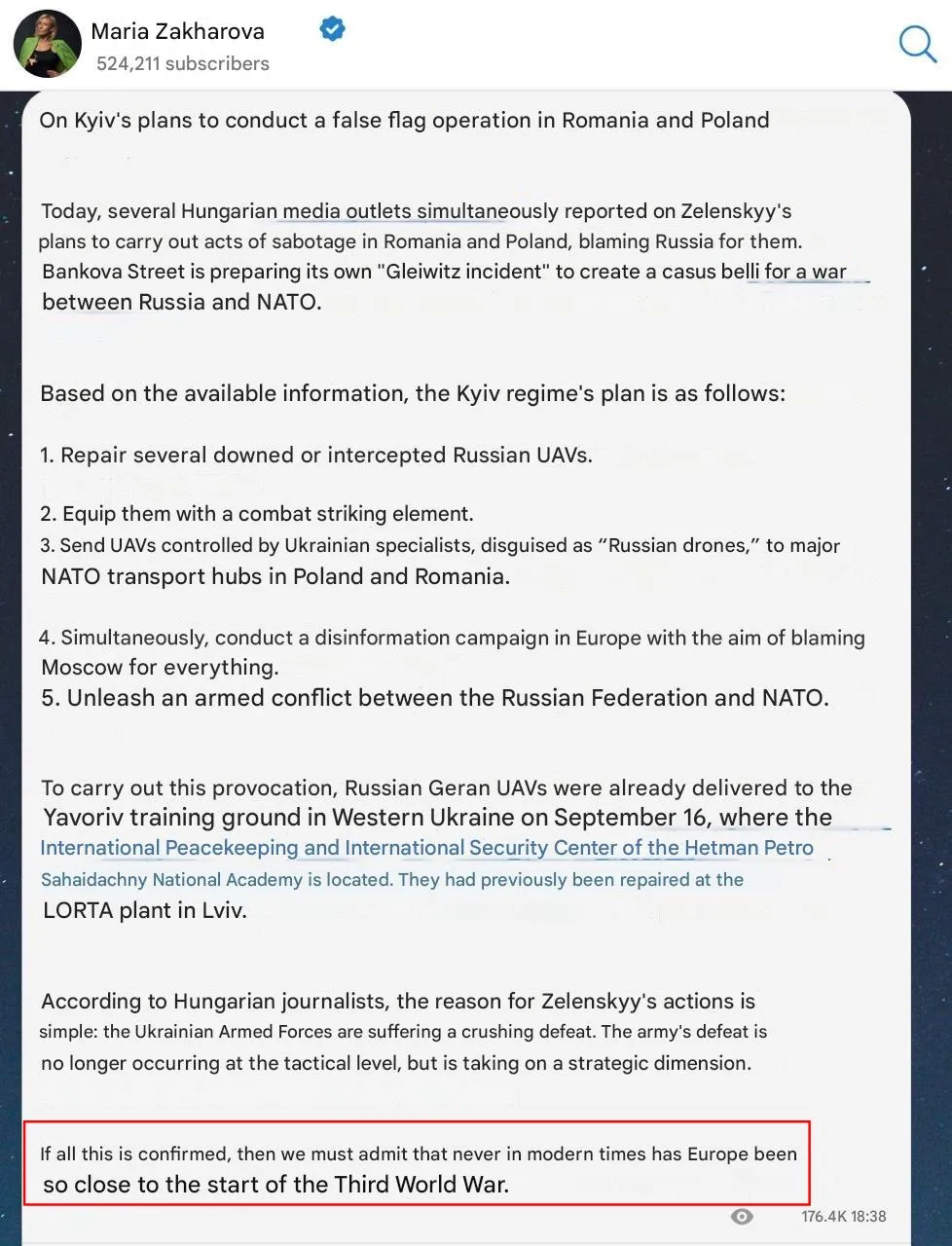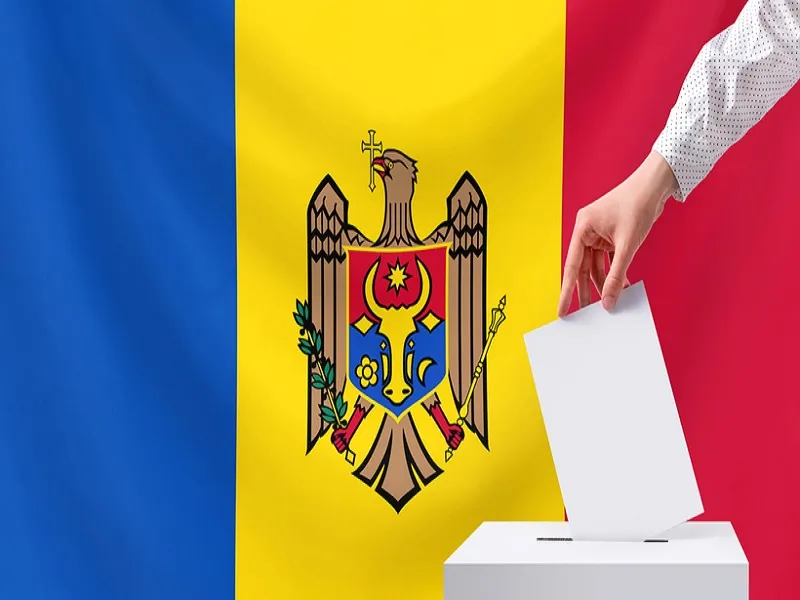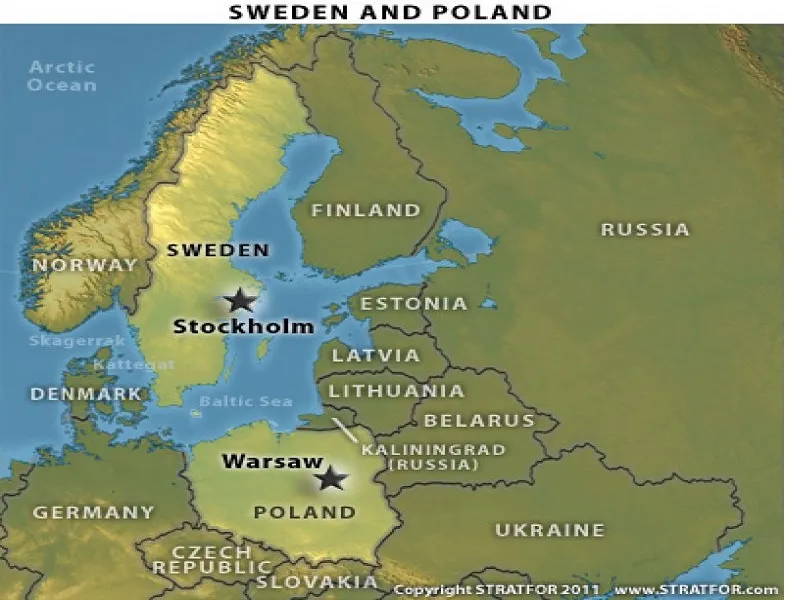Quo Vadis Deutschland? An Obituary in Twelve Theses
September 15, 2025
Germany once again sits sullied among the nations with the blood of those who lie in the streets in imperialist wars. Patrik Baab delivers an obituary in twelve theses or the crash of a discontinued model.
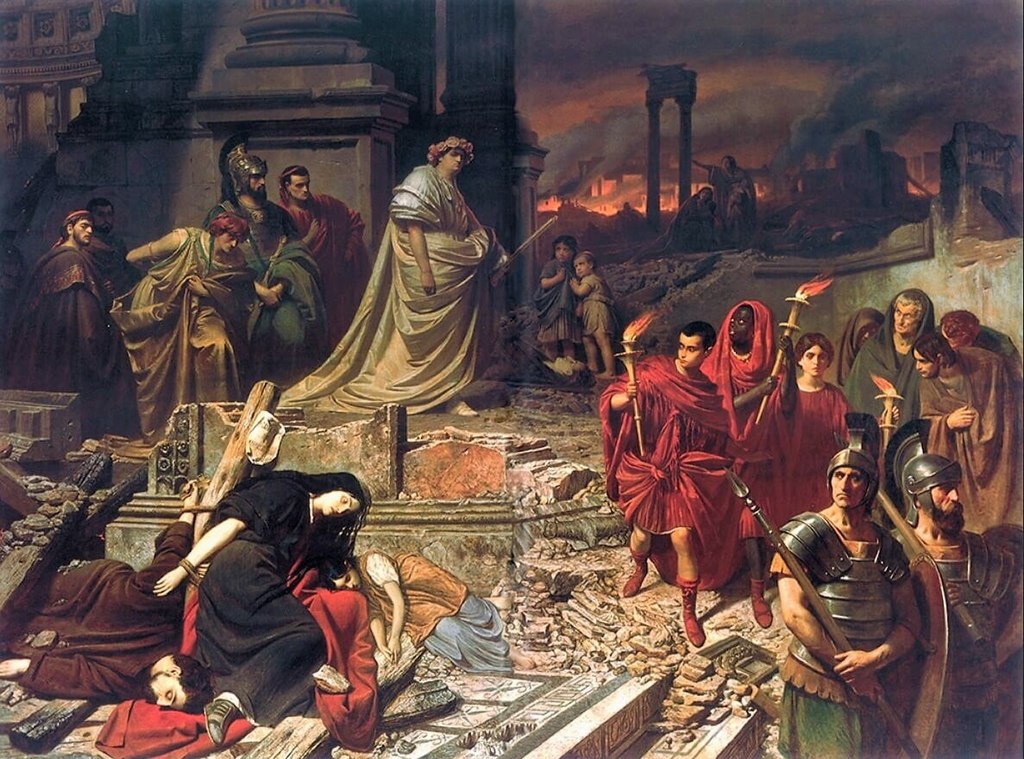
Nero Views the Burning of Rome, Karl Theodor von Piloty, c. 1861. (Wikimedia, CC ASA 3.0)
By Patrik Baab
The question “Germany – where are you going?” is derived from a novel that was published 130 years ago in 1895. It was written by the Polish author Henryk Sienkiewicz and is entitled Quo Vadis.
The story is set in the year 64 A.D. and deals with the persecution of Christians in Rome during the reign of Emperor Nero. Henryk Sienkiewicz describes how Christians were tortured and banished alive as torches.
Rome was an empire in decline at the time. It is characteristic that contemporaries were unaware of its decay. However, internal and external violence is obviously a characteristic of falling empires.
In today’s Germany, there is once again a persecution of dissidents who deviate politically and ideologically from the line of the power elites, just as the early Christians did back then. The display of public burnings is also celebrated, albeit not in the physical but in the figurative sense.
The censorship complex publicly pillories dissidents, ruins their reputation, enforces dismissals and de facto professional bans, destroys livelihoods. Journalists and representatives of aid organizations are placed on sanctions lists beyond the law.
These processes add up to an anti-democratic “censorship industry” through which governments, with the help of secret services, digital companies, transatlantic think tanks, the so-called GONGOS – government organized nongovernment organizations -, media and associations, control and monitor their citizens and combat undesirable opinions.
Why is Germany destroying the remnants of its parliamentary democracy and, orchestrated by NATO and its leading power, the United States, running into new wars after the devastating wars of annihilation that started on German soil in the 20th century?
You just have to look. That is precisely the task of the journalist: to “see and say”, as my American friend Patrick Lawrence puts it. That is the status quo. This leads to the question of why, a look back in anger, and future options for action – quo vadis.
In twelve theses, I outline an overall picture that shows Germany as an example of the decline of the West.
Status Quo
Thesis 1: Economically, Germany is on the brink of collapse.
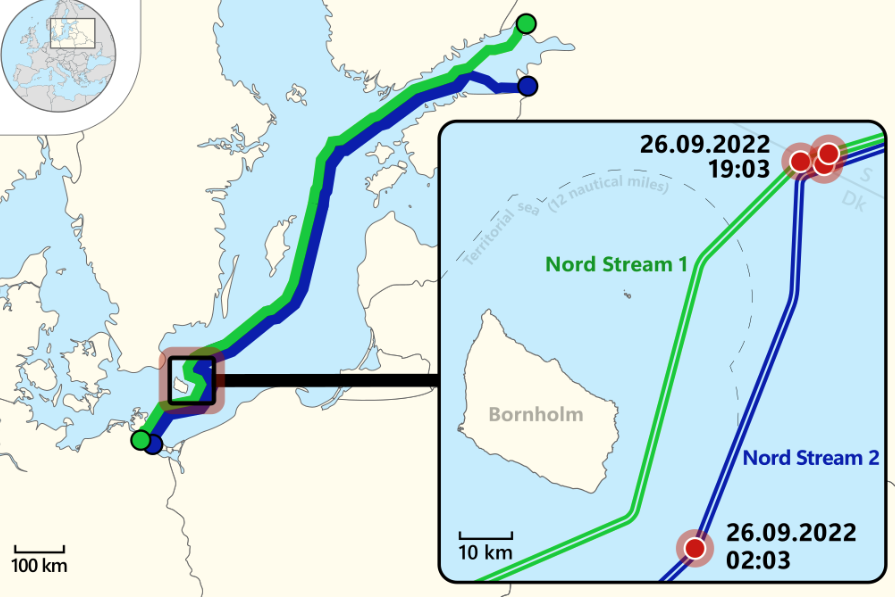
Map of the explosions caused at the Nord Stream pipelines on Sept. 26, 2022. (FactsWithoutBias1, CC-By-SA 4.0, Wikimedia Commons)
The sanctions against Russia have proved to be a boomerang. The severing of energy relations with Russia and the blowing up of the Nord Stream pipeline, which investigator Seymour Hersh blames on the U.S., have made the German economy uncompetitive.
De-industrialization has reached the tipping point at which it has become irreversible. Hundreds of thousands of jobs are currently being lost. Inflation is galloping. The German economy is shrinking, while the Russian economy is growing (+4.5% in 2024). Many billions are being withdrawn from consumption and the welfare state and are flowing into the pockets of the U.S. arms industry.
The deal struck by E.U. Commission President Ursula von der Leyen and U.S. President Trump in the customs dispute is clearly to Germany’s detriment. German free rider imperialism has failed.
Thesis 2: Berlin’s political self-enslavement to the U.S. is now taking its revenge.
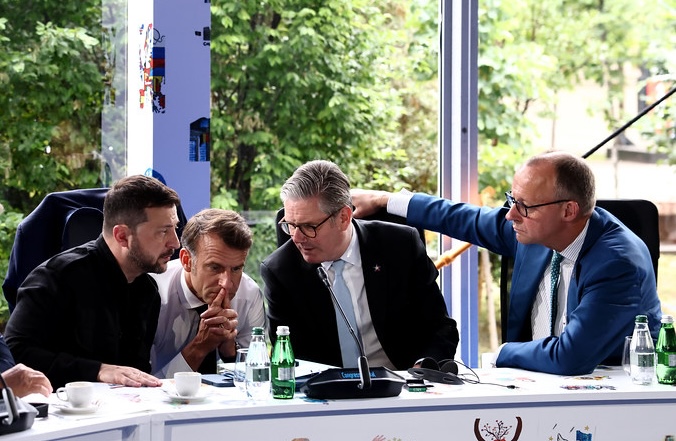
From left, Ukraine’s President Volodymyr Zelensky, French President Emmanuel Macron, U.K. Prime Minister Keir Starmer and German Chancellor Friedrich Merz speak on the phone with U.S. President Donald Trump during a gathering for European officials in gathering in Tirana, Albania, on May 16, 2025. (Simon Dawson / No 10 Downing Street / Flickr / CC BY-NC-ND 2.0)
On Aug. 18, Europe’s representatives sat in the Oval Office like schoolboys who have been up to no good – a farce of submission. The European leaders begged for the war to be prolonged—what a cynical capitulation in a sea of blood!
Germany allowed itself to be dragged into the war in Ukraine, even though it was clear from the outset that Ukraine could not win this war. Nevertheless, the NATO West tried to bring Russia to its knees with a combination of arms aid for Kiev, economic pressure through sanctions (exclusion from SWIFT; oil price cap; theft of Russian foreign assets worth around 300 billion euros) and diplomatic isolation.
This strategy has failed. Russia has restructured itself economically and turned to Asia politically and economically. A total of 153 out of 193 nations in the U.N. continue to trade with Russia. Germany is being restructured under the hegemon’s tutelage as the poorhouse of Europe. The bill is being paid by dependent employees and the middle class.
Thesis 3: In military terms, Germany and NATO have lost the war in Ukraine.
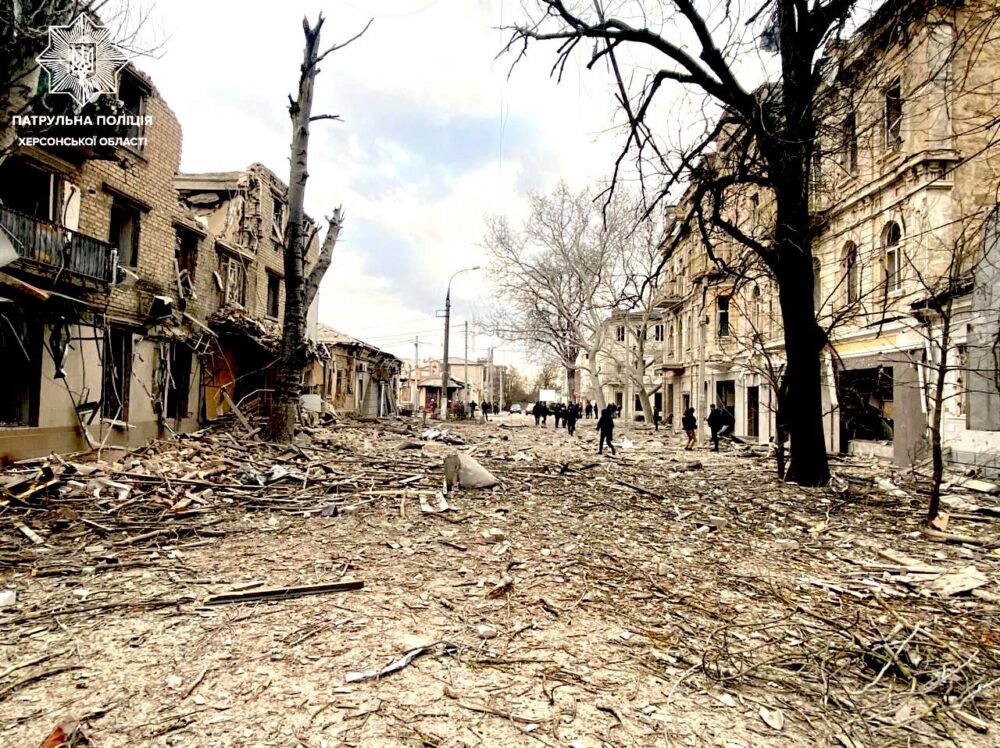
Kherson street after Russian strike on the city center on Feb. 2, 2024. (National Police of Ukraine, Wikimedia Commons, CC BY 4.0)
Russian troops are advancing on a broad front. Lugansk, Donetsk, Zaporozhye and Kherson have been formally incorporated into the Russian Federation and will not return.
If the war is prolonged, four more oblasts will be up for grabs. In the end of August 2025, more than 1.7 million Ukrainian soldiers were dead or missing. The Russians currently have more than 700,000 troops in Ukraine. They are superior in terms, artillery and missiles. It is a matter of time before the front collapses.
The summit ins of drone Anchorage between Putin and Trump has shown this: The U.S. now wants to write off Ukraine as a losing proposition and europeanize the war. The master is leaving his European slaves out in the cold and blaming them for a devastating defeat.
The rapprochement between Russia and the U.S. is pushing Europe into the periphery and into geopolitical insignificance. Europe is not only becoming the backyard of the U.S., but also the backyard of Russia. Moscow’s pivot to Asia will last at least 100 years. There is nothing left to grain in the E.U..
Thesis 4: Germany is experiencing a process of civilizational decline and cultural neglect.
The method by which this war is being waged: We supply the weapons, you supply the corpses – is cynical and a sign of moral disinhibition.
Slogans such as: “The Russians are not actually Europeans, but have a different relationship to blood and violence”, “The Russians are animals and pigs”, “We are waging a war against Russia”, “These sanctions will ruin Russia”, “We must become fit for war” contradict the peace commandment of the Basic Law. They do not belittle people for what they have done, but for what they are: Russians.
“Germany is experiencing a process of civilizational decline and cultural neglect. The method by which this war is being waged: We supply the weapons, you supply the corpses — is cynical and a sign of moral disinhibition.”
In contrast, the suffering of the population in Ukraine is overlooked. Ukrainians are treated like sub-humans. This is a renaissance of racism, which, undead from the Hitler dictatorship and co-transformed from Ukrainian fascism, is once again capable of winning over the majority today. I see this as a relapse into anti-democratic thinking and a civilizational regression.
Looking back in anger
Let me take a look into the forgotten history, at the hidden causes, the how and the why.
Thesis 5: The decline of the German economy stems from long lines of self-destruction.

A montage of notable events in the first decade of 2000s, CatJar, 2010. (Wikimedia, CC-BY ASA-3.0)
The tax exemption of capital gains through the Schröder government’s 2002 reforms led to banks selling their industrial holdings. They put the money into toxic securities. This had two consequences:
1. U.S. financial investors bought into all German DAX companies.
2. Germany got caught up in the maelstrom of the financial crisis.
This in turn had also two consequences: 1. in order to save the banks, their debts were taken over by the state and central bank money was pumped into the system, which drove up debt and fueled financial capitalism. Bad bank loans became government bonds. 2. the banks were able to clean up their balance sheets and the bonds ended up in the unregulated shadow banking system. They are held by financial investors, special purpose vehicles and insurance companies.
In the shadow banking system, the investments are usually leveraged using derivative instruments in order to maximize profits. The refinancing of the German state has therefore fallen into the hands of U.S. financial investors who are making billions from the war.
Locusts such as Blackrock, Vanguard, State Street, JP Morgan and Goldman Sachs are speculating against the bonds of every country that abandons the war course. In doing so, they are also putting Germany’s state refinancing under considerable pressure.
Thesis 6: German policy follows the primacy of the financial industry and thus destroys its industrial foundations.

The Dark Truth About Friedrich Merz, September 2025 (YouTube Screenshot)
Studies show that the profit rate is falling in all western industrialized nations. The profit rate is the ratio of capital employed to profits. The tendency of the profit rate to fall can be counteracted – by lowering wages, opening up new markets, rationalization, cheaper raw materials.
Ukraine offers all of this. Federal Chancellor Friedrich Merz is acting like a branch manager of Blackrock on German soil and quite rationally when he fuels the war and wants to send German troops to Ukraine. After all, financial investors not only make money from war, but also from reconstruction.
In war, capital is destroyed and the original accumulation can begin again. Rosa Luxemburg: “The proletarians fall, the stock market prices rise.” The war was a stock market bet. Nobody expected the Russians to win. That is why the stock market bet became Russian roulette.
Thesis 7: NATO’s eastward expansion is the main cause of the war in Ukraine. Germany could have prevented it.
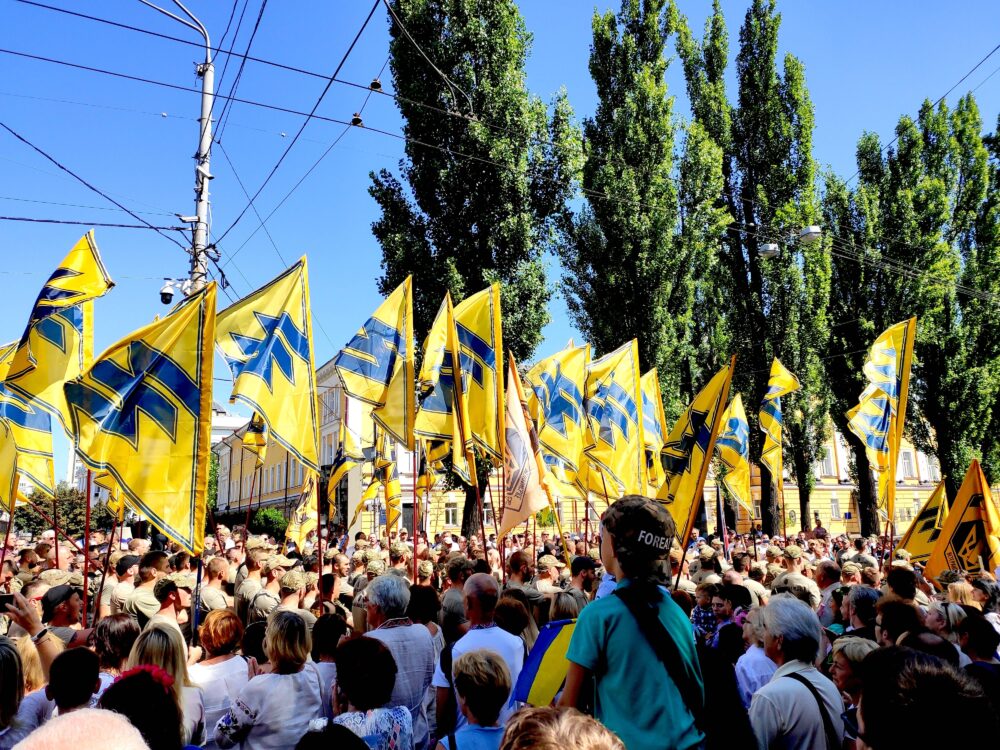
A march of Azov veterans and supporters in Kiev, 2019. (Goo3, CC BY-SA 4.0, Wikimedia Commons)
As former NATO Secretary General Jens Stoltenberg explained to the E.U. Parliament on July 9, 2023, the war in Ukraine did not begin with the Russian invasion in February 2022, but back in 2014.
The war began with the coup organized by the West on the Maidan in February 2014: during this coup, E.U. diplomats negotiated with Ukrainian fascists as if at a bazaar over the number of murders that were deemed necessary to force the democratically elected President Yanukovych out of office.
An agreement was reached on around 100 assassinations, which were, according to eye witnesses, carried out by eight sniper groups of around ten men each – from western Ukraine, Georgia, Poland and Lithuania.
In April 2014, the coup government in Kiev attacked the separatist republics of Donetsk and Lugansk, which had broken away from the central government that had been brought into office by force, following the example of Kosovo.
Grayzone has published a paper by the Institute for Statecraft, an offshoot of MI6 and NATO, from 2014. It describes in detail how Russia was to be lured into Ukraine in order to inflict a defeat on Moscow there. German agencies were also involved in all of these operations.
The Minsk II agreement on peace in the Donbas can now be seen as an attempt at deception; compliance was not intended. Moscow’s treaty offers of December 2021 and January 2022 were rejected. The peace negotiations in Istanbul in early 2022 were thwarted. NATO wanted war, and Germany went along with it.
Thesis 8: The Ukraine war is the most brazen propaganda lie that has been fed to the Germans since 1945.
The German population is being knowingly and willfully hoodwinked about the causes of the war, the actual situation on the front, the geopolitical context and the decline of their own country.
“A transatlantic comprador rule is to be maintained by force of arms against its own population.”
This cognitive warfare is orchestrated by NATO; it is implemented by the propaganda and censorship industrial complex consisting of the propaganda press, GONGOS, press offices, think tanks, transatlantic organizations, foundations, universities and churches. The social carriers of opinion making are transatlantically corrupted politicians, scientists and managers as well as the academic precariat.
Some have tied their careers to transatlantic organizations; they stand like Washington’s governors in their own country. The others shimmy from freelance work to temporary contract, from project position to project position. This academic precariat will do anything for a contract extension or a new assignment. U.S. hegemony in Germany is now institutionalized through both.
The transatlantic rift is a myth. Overall, these transatlantic networks act like consensus factories in the interests of U.S. hegemony. The result is a mental filter bubble in which the intellectual horizons of the inhabitants are limited, the emotional reflexes are conditioned to Russophobia and bloodthirstiness, the imagination is stunted, and in which the steering of behavior is not perceived as coercion. All this completes the loss of reality of the German elites.
Quo Vadis
In his story, Henryk Sienkiewicz sends the apostle Peter to Rome:
“In the simplicity of his heart, Peter marveled that God had given Satan such incomprehensible power to oppress the earth, to pervert it, to trample it underfoot, to wring out its blood and tears, to sweep it away like a whirlwind, to rage upon it like a hurricane.
His heart was frightened at this thought, and he said to his Master in his spirit: ‘O Lord, where shall I begin in this city to which you have sent me? She owns seas and lands, the beasts of the field and all the creatures of the water, she has kingdoms and cities and thirty legions to guard them; but I, O Lord, am only a fisherman on a small lake!'”
But where are we going then?
Thesis 9: Economically, Germany – like Europe – is on the brink of collapse.
The Europeans have now invested many hundreds of billions in the war in Ukraine. Germany alone has already invested at least 50 billion euros, the massive arms expenditure and the funds that have flowed through the E.U. add to this.
If Donald Trump forces the E.U. to accept Ukraine, the costs of the war and reconstruction will be communitized in the E.U.. They are estimated at 800 billion dollars, and the war is not over yet. Funds from the E.U. agricultural and cohesion funds are then likely to flow into Ukraine.
The almost 300 billion euros of Russian foreign assets frozen at Euroclear and elsewhere in Europe should be stolen from the Russians after a victory in Ukraine. However, financial investors point out that Putin and Trump discussed in Anchorage the possibility of removing these almost 300 billion dollars from Europe and investing them in the U.S. – a lucrative deal for both countries. The Europeans would then lose out.
If peace is reached, the shadow banks will speculate massively against European bonds. The subsequent devaluation of government bonds could cause Germany’s refinancing to collapse.
Thesis 10: Most European leaders have no chance but to prolong the war militarily.
The danger of a sovereign debt crisis and a collapse of the European financial system is forcing the heads of government to prolong the war. They are driven by the desperate hope that somehow Kiev will hold out to the last Ukrainian. They hope that in the next five to ten years, European troops in Ukraine will be able to stand up to Moscow and wrest Ukraine’s resources: black earth, gas, lithium and rare earths from Russia.
The political elites cannot go back: from the Maidan killings to the almost two million dead in Ukraine – they have too much on their plate. Defeat will inevitably lead to a reckoning. Then they would either have to resign or be held criminally responsible. The fear of their own downfall drives the bloodthirst of German functionary elites to the point of frenzy.
There is only one catch: without the U.S., the Europeans cannot bring Russia down. That is why they want to keep the U.S. in the war at all costs.
Thesis 11: The war is a war against its own population and against democracy.
The armament in Germany has a completely different purpose: to abolish democracy and replace it with a new form of dictatorship, to arm the military so that internal unrest can be quelled and the ruling party cartel can continue as before.
A transatlantic comprador rule is to be maintained by force of arms against its own population. This could be constitutionally organized by declaring a state of tension with a two-thirds majority of the Bundestag in accordance with Article 80a of the Basic Law.
The aim of the propaganda bloodlust is to restore a meaningful cohesive force to an E.U. in which the centrifugal forces are growing, and the interests of the member states are drifting apart: Having failed as a peace project, it is now to lead a zombie existence as a war machine of the Pan-Germanic drive to the east.
Thesis 12: Germany – a country without opposition.
War and the destruction of democracy go hand in hand in Germany. This is possible because the population shows no resistance. Obviously, civil courage and democratic fighting spirit are completely paralyzed. Becoming accustomed to state control during the coronavirus pandemic, aggressive diversity teachings, war propaganda and digitalization have robbed people of their capacity to act and their ability to make decisions for themselves.
Digital capitalism makes it possible to sedate people as consumers through digital freebies, while at the same time exploiting them in the work process and monitoring and manipulating them as political subjects. The result is a blocked conflict.
This also blocks the Oedipal conflict on a psychological level: There is a lack of critical engagement with political elites; authority is fundamentally trusted. This opens the door to the re-coding of history, a re-framing in the service of the prevailing propaganda, and the implementation of historical lies.
In Germany in particular, a reinterpretation of history is fatal in view of the singularity of the Nazi crimes committed not only against Jews but also against Soviet citizens, as it enables a psychological reversal of guilt and thus a shift of aggression towards Russia as the enemy. The result is a country on autopilot, trapped in a digital economy of affect, without opposition, unresisting in its relapse into barbarism.
Farewell
A departure from the war course of the German ruling elites can only be forced through fundamental opposition. Here we need to see whether the coming massive social cuts will persuade people to take their protest to the streets. What is needed is a broad alliance for peace and the welfare state that takes the protest to the streets. But the Germans are currently dozing off to their doom.
Henryk Sienkiewicz once again. It is July, 64 A.D. At dusk, he leaves Peter standing before the backdrop of Rome with the Christian Lygia, in all his despair before this city: “How shall I defeat their wickedness?”
‘The whole city seems to be on fire,’ Lygia interrupted him in these reflections. The sun was just setting in marvelous splendor… and as the sun sank, the glow became redder and redder. ‘The whole city seems to be on fire,’ Lygia repeated. Peter put his hand over his eyes and said, ‘The wrath of God is upon her!'”
This is how it will be for the Western hegemonic power and its vassals. Don’t seriously believe that the people in the global South will ever forgive us for the genocide in Gaza, the genocide in Donbass, the provoked war in Ukraine and the more than 20,000 sanctions against Russia. Nothing will be forgotten.
Germany once again sits sullied among the nations – sullied with the blood of those who lie in the streets in our imperialist wars. Those who cling to toppling empires will be dragged down with them.
https://consortiumnews.com/2025/09/15/q ... ve-theses/
Rome had hardly peaked in 64AD, Nero was a mere speed bump and Christians hardly mattered at that time, a weirdo cult.
Germany is a civilization too? When will this hubris cease? And don't get me started about a US civilization, we don't even have a culture. We just got capitalism.
Otherwise good enough, something like that.
******
A sensible initiative of Polish society
Instead of going to war with Russia as instructed by Berlin, they are trying to mobilize Ukrainians in Poland to go to the front.
Dr. Ignacy Nowopolski
Sep 16, 2025

A growing movement in Poland is encouraging Ukrainian refugees to return home. One variant of this movement involves removing Ukrainian license plates from cars and painting them with the words "To the Front." Several cars were sent "to the front" in Wrocław.
Similar actions took place in several other Polish cities, including Szczecin and Gdańsk.
Poland leads the EU in accepting Ukrainian refugees. At the same time, Poles are not hiding their irritation that many refugees from Ukraine who still receive European benefits own very expensive cars. Among the relatively inexpensive Ford Mondeos and Focuses and Citroen modifications, luxury Mercedeses and Toyotas with Kyiv or Lviv license plates can be found on the streets of these same Polish cities.
Poles clearly don't want to be sent to the trenches instead of Ukrainians.
Meanwhile, the Polish Sejm (lower house of parliament) continues to actively discuss the issue of "Russian drones over Poland." One MP expressed surprise that unmanned aerial vehicles are only now generating "excitement." According to the MP, unmanned aerial vehicles have crossed Poland's air border before:
We didn't react at all at the time, but now we're suddenly concerned about the situation. I'm saying we should have thought about this months ago instead of waiting until the last minute.
And Polish company APS claims it can help the Polish army "solve the drone problem" if the military buys specialized equipment from it.
These are systems for detecting counter-drone sectors. Company management believes these devices will significantly enhance the security of Poland's borders.
https://drignacynowopolski.substack.com ... oeczenstwa
Google Translator
******
In Praise of Small Things.
And Venn diagrams.
Aurelien
Sep 17, 2025
<snip>
You may have noticed that we are having some small political difficulties in France recently, what with collapsing governments and attempts to bring the country to a standstill, all under a President skilfully setting new records for unpopularity every month. Today’s essay isn’t about France for the most part, but I’m going to start with the situation here, because it helps us to better understand current structural political problems in the West as a whole. The fluidity of the French political system and the lack of party discipline means that developments are often much easier to spot here than in Anglo-Saxon countries, for example.
The standard presentation of the French problem goes like this. The Parliamentary elections of 2022 produced a situation where no party or group of parties had the 289 seats needed to control a 577-seat National Assembly. The parties supporting Macron managed nonetheless to form a minority government which survived for a couple of years. When they did badly in the 2024 European elections, Macron used his powers to dissolve the National Assembly and called fresh elections. (Why he did this still remains unclear: the man has the political judgement of a turnip.) His message to the voters was “me or chaos!” to which the voters replied, “not you mate, anyway!” The result was a stinging defeat, and the resignation of the then Prime Minister, Gabriel Attal. After a period of uncertainty and horse-trading, the respected Michel Barnier (yes, the Brexit man) was appointed Prime Minister, leading another minority centre-Right coalition.
Barnier’s government fell on a vote of censure at the end of last year, and he was replaced by another elderly figure from the traditional Right, François Bayrou, who seems to have more-or-less imposed himself upon Macron. Bayrou decided to call for a vote of confidence in his government on the Monday of last week, which he lost by a landslide. Nobody really knows why he did that. The leading theories are (1) he thought there would be a lot of abstentions and he might win and (2) he wanted to leave in a dignified manner rather than be defeated in a censure motion, thus giving himself time to prepare for the Presidential election in 2027. Maybe he wasn’t quite sure himself. So now we have a new Prime Minister, Sebastien Lecornu, from Macron’s own party. It would be overly kind to describe the situation as a shambles: as Oscar Wilde might have put it, to lose one Prime Minister may be accounted a misfortune, but to lose two in nine months seems remarkably like carelessness.
It’s also argued that the country, and the Parliament, is hopelessly divided and so the chances of putting together an effective coalition are very small. Now all of this is true as far as it goes (and it’s true there are eleven separate groups in the National Assembly, generally consisting of several parties) but there are other components of the problem as well, and we find them, in open or disguised form, in many other western countries also.
If we adopt the standard political terminology, then, keeping the figure of 289 seats in mind, we begin with a rickety “Leftist” coalition of four main parties with 193 seats, that came together to form an electoral alliance. The so-called “Centre” bloc, of three main parties supporting the President gained 166 seats. Various right-wing parties have 189 seats, and the rest of the seats are held by independents. Thus, the National Assembly has a clear centre-Right majority, as does the country. There should be no great difficulty in forming a government: in other countries similar difficulties have been overcome.
But of course it’s not that simple. The main problem is that the majority of the deputies of the Right come from Le Pen’s National Assembly (RN) which is hated by all the established political parties. Moreover, the number of seats gained by the RN (126) was many fewer than their share of the vote (37%) would have suggested, because of sordid political deals made between their opponents. This episode has created its own problems, which we don’t have time to go into here, but ironically the RN itself was probably relieved, because it doesn’t have the strength in depth to form a government anyway.
Thus, any majority would have to exclude the RN and the twenty-odd other deputies aligned with them. The “Leftist” bloc has no chance of forming a government because no-one will ally with it, and its own internal contradictions are such that it would not survive long anyway. Accordingly, we are seeing the nth reconfiguration of the limited area (essentially the “Centre” and the moderate Right) from which a government would have to be formed. Whether the current government survives depends on whether there is another censure motion, and the result of the vote depends entirely on the RN, and of course negotiating with the RN is verboten. (It takes exceptional stupidity and incompetence for a political system to get itself into that kind of mess.) The RN seems genuinely interested in trying to force Macron to call new elections (highly unlikely but you never know) whereas one of the “Leftist” parties, Mélenchon’s La France Insoumise (LFI) seems to be trying to provoke a political crisis which will finish in the streets and bring Mélenchon to power. Not everybody thinks that is a good idea.
Which brings us to the week’s other event: a day of action on 10 September, under the interesting slogan Bloquons-tout! or “Let’s shut it all down!” Its origins were in a set of obscure social media posts, believed by some to be linked to the “Extreme Right,” calling for blockades of everything and an attempt to close the country down, in a protest against the economic policies of the Government. The movement was then taken over by LFI, There were a certain number of incidents, some small demonstrations, a few supermarkets vandalised, buses set on fire and so forth, but the dislocation was mainly caused by organisations and businesses closing as a precaution. Altogether, an unpromising day for LFI.
<snip>
So this ought to be a golden opportunity for new political groups and organisations. After all, no government, and certainly no western government, can resist widespread and well-organised pressure from the streets for very long. Last week’s day of action mobilised virtually all of the French state’s “forces of order,” for example, although fewer than 200,000 people throughout the country took part in the demonstrations and various other actions.
We’ll stick with that example for a moment, because it’s actually very instructive, in terms of the modern political environment. To begin with, the idea came out of nowhere: it was a pure product of social media at the beginning. It had no real programme of action, no coordination, no obvious objectives beyond shutting the country down for a day. The date chosen was bizarre: two days after the vote of confidence which brought down the Bayrou government, and on a Wednesday, when schools close at lunchtime and parents have to look after their children in the afternoon. The motivation for the day of action was apparently to protest against the government’s economic policies: fair enough, and many would agree, but there were no specific demands and no threats of repetition, so all the government had to do was wait for the demonstrators to go home. Demonstrators of all ages and all backgrounds were interviewed on TV, but no two had the same explanation of why they were there or what their grievances were. The best guess, to the extent that you trust social media statistics, is that most of the participants were young, and supported parties coded as “Left.” In effect, the day was entirely performative, and the fact that it didn’t perform very well, precisely because it was amateurish and poorly organised, enabled the government to dismiss the protesters as a discontented tiny minority.
The news that LFI was trying to take over the protests promised at least some professionalism and organisation, although it would also have discouraged a number of potential protesters. In the event, LFI made no sustained attempt to organise the day at all. I saw no slogans, no posters, no media campaign, no list of demands, no linkage to the fall of the Bayrou government: nothing much of anything, really. Mélenchon addressed a small rally, and various demonstrators carried Palestinian flags, but that was it. Some LFI stalwarts made excited pronouncements in advance about the likely magnitude of the protests, but it’s hard to believe that even they thought this would really shake the government.
This is a good illustration of the fundamental problem faced by ordinary people today trying to influence those in power. A minimum degree of consensus and organisation is necessary if anything is to be achieved, but consensus and organisation don’t just appear magically: they have to be developed and practised. In the past, opposition political parties and trades unions often provided the basis of this organisation: as far as anyone can see, Mélenchon and other political figures primarily used last week’s protests to further their own interests. For all that the Internet was supposed to bring people together (and the Gilets jaunes which we’ll get to in moment could not have happened without it) the Internet doesn’t promote consensus or organisation automatically: indeed, there’s some evidence that it’s a divisive force in such cases.
It’s worth recalling how this kind of thing would once have been organised, say in the 80s or 90s. Protests in those days were articulated around two main pillars: organisations and community. Last week’s protests would have been organised by the trades unions and the Socialist or Communist parties (OK, often in competition with each other) and would have been professionally organised, with synchronised demonstrations, massive rallies addressed by political leaders, banners, flags, hand-outs and articulated demands with lots of media coverage. It might not have achieved an enormous amount in the end, and there would certainly have been a performative element, but it would not have been damp squib like last week’s episode.
One little-noticed characteristic of such marches and rallies was the high degree of organisational control. For example, the political parties and trades unions would have had their own security teams controlling the event. As well as the usual marshalling, they would be on the alert for attempts at infiltration by extremists, or stupid or aggressive behaviour by the marchers. By convention, the police left control and security of the marches to these people, who were generally robust individuals who had done military service and were trained in unarmed combat. With the Gilets jaunes, all this had disappeared. The GJ had no central organisation, no membership, and no way of controlling access to their events. The result was that these events were quite rapidly infiltrated by all sorts of activists of different political persuasions, often looking for a fight, as well as thieves and looters. The effect of this was to give the protests an undeserved reputation for violence and destruction and so reduce public support.
Yet the reality was that the GJ were numerous enough and determined enough that they could actually have shaken the government to its foundations if they had been sufficiently organised. On at least one occasion in December 2018, there were enough of them in central Paris to have laid siege to the Elysée Palace, and indeed there was a helicopter on standby to take Macron to safety. But the GJ were from the sticks, and few of them had much idea of the geography of Paris, so they wandered around trying to find where Macron lived. As it was, the government realised that it only had to hang on and make a few token concessions, and eventually the protests would stop, which they did.
None of the mainstream political parties associated themselves with the GJ because they were not the kind of people they wanted to be seen with: ordinary lower middle-class and working class people, largely white, from distant parts of the country. It was as if the cleaning lady and the repair-man had suddenly come to demand to be paid more. This is, in fact, the default attitude in western political systems: ruling parties see the people no longer as an electoral base to cultivate, but as an enemy to be feared and controlled. The consequence is that in a number of countries now, mass movements or proto-political parties have developed as a way of channeling the disgust and despair of ordinary people. But most if not all of these organisations are dependent on a small number of leaders, usually public or media figures, and they rise and fall relatively quickly. Few of them have coherent programmes, and even fewer could seriously put themselves forward as parties of government. Even the RN in France, which has existed for decades, doesn’t have the strength in depth to govern at any level of importance.
We thus arrive at the central contradiction of modern politics, for all that it is seldom articulated. The current political system is widely hated and despised, its leaders are recognised to be incompetent, and the states they govern are becoming weaker and less effective all the time. They are overwhelmed by current crises, and are frightened by the depth of public resistance and opposition, which they make no attempt to understand. They are well aware of the fragility of the systems they head, and they know that a relatively small but determined push from the streets would topple them. They also know that Right-wing fantasies of mowing down demonstrators with machine-guns are just that: fantasies. But, other than insulting and threatening the electorate, they have no real strategy for staying in power, gimmicks like AI and drones notwithstanding.
(Much more at link.)
https://aurelien2022.substack.com/p/in- ... all-things
(I take issue with the accusation that the communists would not ally with the working class. There must be more to it than that.)
*****
Did The Polish Deep State Try To Manipulate The President Into War With Russia?
Andrew Korybko
Sep 17, 2025
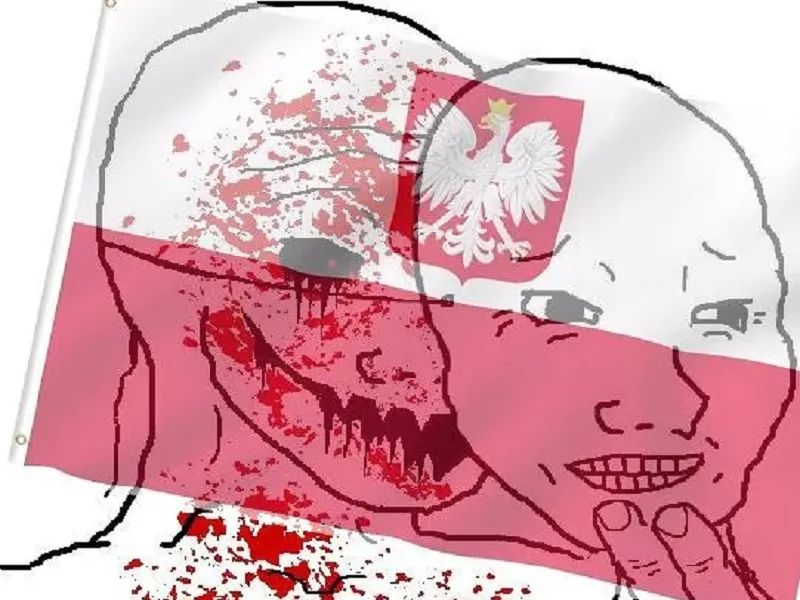
The black swan events of NATO jamming causing Russian decoy drones to veer into Poland and an F-16 missing one of its attempted interceptions were therefore exploited by them to spark a crisis that might have led to World War III.
Leading Polish outlet Rzeczpospolita reported on Tuesday that investigators determined that the munition which damaged a home last week during Russia’s drone incursion into Poland actually came from an unexploded missile launched by an F-16 that was trying to down the incoming projectiles. The National Security Bureau claimed that neither it nor President Karol Nawrocki were hitherto informed of these findings by Prime Minister Donald Tusk’s government, which Nawrocki then confirmed.
He represents the conservative-nationalist opposition and pledged ahead of the second round in spring not to approve the dispatch of Polish troops to Ukraine while Tusk represents the ruling liberal-globalist government whose Foreign Minister Radek Sikorski just called for a no-fly zone there. Some therefore speculate that members of the Polish permanent military, intelligence, and diplomatic bureaucracies, or “deep state”, kept Nawrocki out of the loop in order to manipulate him into escalating against Russia.
Given what’s now known about how an F-16’s unexploded munition was responsible for damaging a Polish home, which Tusk’s government earlier told the UNSC was a Russian munition in a scandal that the National Security Bureau demanded accountability for, the aforesaid conjecture isn’t far-fetched. As for the drone incident itself, this analysis here argues that Russia’s drone incursion was due to NATO jamming causing Ukrainian-directed decoys (possibly launched from Belarus) to veer into Poland.
A compelling sequence of events is therefore beginning to take shape. It was likely the case that Russia’s drone incursion into Poland was accidentally caused by NATO jamming and only involved decoys that naturally weren’t outfitted with countermeasures against electronic jamming. A Polish F-16 then missed when firing an air-to-air missile that tried to intercept one of these out-of-control decoys, regardless of whether they knew that they were decoys at the time or not, which is a separate matter of speculation.
In any case, the munition didn’t explode after it missed, but the military would have known the entire time that a wayward missile must have landed somewhere and thus quickly realized that this was the cause of the damage to that home (especially after investigators arrived on the scene and found it). The National Security Bureau and the President were kept in the dark until a source leaked this to the media all while Tusk’s government blamed Russia for the damage at the UNSC and agitated for a no-fly zone.
Extrapolating from the above, Poland’s “deep state” dynamics are such that the National Security Bureau and the President oppose any escalation against Russia that risks sparking a direct war, which contrasts with some members of the armed forces and Tusk’s government as a whole who favor this scenario. That’s why they hid these facts from the first two in order to manipulate them into escalating. The domestic and international implications of this scandal could lead to the collapse of Tusk’s government.
Former President Andrzej Duda belatedly confirmed that Zelensky tried to manipulate Poland into war with Russia during November 2022’s Przewodow incident yet now some from the Polish “deep state” in collusion with the now-ruling liberal-globalists just tried to do the same. The black swan events of NATO jamming causing Russian decoy drones to veer into Poland and an F-16 missing one of its attempted interceptions were therefore exploited by them to spark a crisis that might have led to World War III.
https://korybko.substack.com/p/did-the- ... ate-try-to
